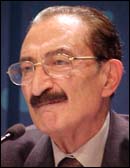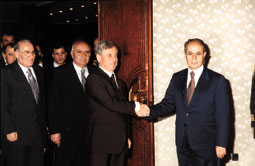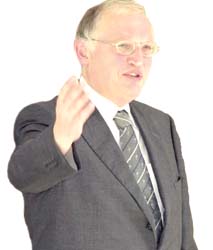7
June 2002
![]()
2. "Turkey braces for critical summit to solve rift over EU bid", President Ahmet Necdet Sezer summoned the leaders of the three-way ruling coalition and the three opposition parties in the face of mounting concerns that Turkey, the laggard among the 13 candidates for EU membership, will miss its target to obtain a date for the start of accession talks by year-end.
3. "EU appraises Turkey's 'accomplishments'", while the latest "allegedly and cotroversial" National Security council (MGK) decisions conveyed on May 30 on the EU and capital punishment, besides the "tension" between deputy prime ministers Mesut Yilmaz and Devlet Bahceli is on Turkey's agenda on the "EU road." Some EU diplomats claim that Turkey has not fulfilled the necessary requirements even though they say they did.
4. "Turkish Islamist leader risks jail over unjustified wealth", a Turkish prosecutor on Thursday charged Recep Tayyip Erdogan, a prominent Islamist politician, with accumulating wealth in unclear circumstances, the Anatolia news agency reported.
5. "The latest decisions by the MGK inspires hope: Verheugen", the Commissioner responsible for the EU expansion said that Turkey had made considerable improvements since the Helsinki Summit.
6. "TURKEY: Government Open To Tackle Displaced Persons Issue, U.N. Says", U.N. special representative on internally displaced persons Francis Deng said yesterday that his recent visit to Turkey revealed openness on the part of the government to address the problem of internally displaced persons inside its borders.
1. - BBC - "Turkish PM pulls out of key meeting":
7 June 2002
Turkish Prime Minister Bulent Ecevit will not attend a crucial meeting
on Friday due to his ill health, raising fresh concerns about the country's
political future. It will be the second time in just over a week that
Mr Ecevit, who was hospitalised twice last month, has not been present
at a key meeting.
Friday's meeting was called to seek consensus on human rights issues to help Turkey join the European Union.
Key topics up for debate include broader rights for the country's Kurdish population, the death penalty, and restrictions on freedom of speech.
Last week, Mr Ecevit missed an important meeting of the National Security Council.
Correspondents say that this latest withdrawal is likely to fuel calls for his resignation, although Mr Ecevit has insisted he is well enough to continue to govern.
Mr Ecevit's Democratic Left Party fears the party would not survive after him, as he has no clear successor. Mr Ecevit's leadership is also considered essential to the future of the shaky coalition government.
Early elections
The second biggest coalition partner, the Nationalist Action Party, has already indicated that they would seek a new government, probably led by them, if Mr Ecevit stepped down.
Elections were last held in 1999
This could only be a caretaker government, which would mean early elections.
The widely-shared fear is that none of the coalition parties would win a sizable majority - some, or all, may not even pass the 10% threshold.
Early elections are not favoured by many, as it seems almost certain to produce more instability, which Turkey can ill-afford.
The country is still recovering from a deep economic crisis with the help of a $16bn austerity package from the International Monetary Fund.
Any prolonged absence by the prime minister due to serious illness is likely to make the financial markets even more jittery.
Mr Ecevit has been suffering from a broken rib and a vein infection in the leg, but the press has also suggested that he has Parkinson's disease and myasthenia gravis, a nervous system disorder characterised by weakness and fatigue.
Following the news that he was too ill to attend the meeting, Turkey's main stock market dipped more than three percent.
Market players fear Mr Ecevit's resignation will spark instability, and that early elections could bring the moderate Islamist party, the AKP, to power.
The AKP has opposed intervention in Turkey by the IMF,
which many Turks feel has resulted in too many privatisations and job
losses. ![]()
2. - AFP - "Turkey braces for critical summit to solve rift over EU bid":
ANKARA / 6 June 2002
Turkey's political leaders geared up for a key summit on Friday
aimed at breaking a deadlock over EU-sought democracy reforms as doubts
lingered over whether ailing Prime Minister Bulent Ecevit would be able
to attend to prove he retains his grip on power.
President Ahmet Necdet Sezer summoned the leaders of the three-way ruling coalition and the three opposition parties in the face of mounting concerns that Turkey, the laggard among the 13 candidates for EU membership, will miss its target to obtain a date for the start of accession talks by year-end.
The meeting has gained added significance as a test for Ecevit, who has spent the past month either in hospital or at home with a long list of ailments, prompting calls on him to step down. Ecevit, 77, has not made a public appearance since May 28, missing a top national security meeting. He has said in several written statements that he is keeping up his duties in a bid to dissipate fears that his departure from office could destroy the coalition and trigger snap polls at a time when political stability is crucial for the success of an IMF-backed economic program.
If Ecevit does not show at Friday's summit that he is fit, "it will be impossible from now on to back the official 'no problem' thesis," columnist Murat Birsel wrote in the Sabah daily on Thursday. A member of parliament in Ecevit's party said Thursday that it was not clear whether the prime minister would attend the summit, adding that he would decide after a medical check-up before the start of the meeting.
Ecevit is suffering from a neuromuscular disease, a cracked rib, spinal problems and an inflamed leg vein. Attention at the summit is also expected to focus on Ecevit's deputy and senior coalition partner, Devlet Bahceli, who has recently voiced opposition to fundamental reforms Turkey should fulfil to catch up with EU norms.
Bahceli's far-right Nationalist Movement Party is opposed to the abolition of the death penalty, a basic EU norm, on the grounds it will save condemned Kurdish rebel leader Abdullah Ocalan from the gallows. The party is also reluctant to support the legalization of broadcasts and education in the language of the sizeable Kurdish minority, fearing that it could fan Kurdish separatism.
The Turkish army, which wields significant influence in politics, is also seen as a behind-the-scenes opponent of the said reforms, though the military-dominated National Security Council urged the government last week to speed up work for EU membership. But public pressure on EU opponents reached an unprecedented scale Wednesday when 175 non-governmental groups, the biggest civic alliance in Turkey so far, issued a joint declaration in support of democracy reforms.
"The summit in the presidential palace is an historical opportunity... The declaration of the 175 civic groups should be seen as an order to parties which believe in democracy," Sabah's Gungor Mengi said. Many observers doubted the summit would produce a consensus, saying that the opposition could manipulate the meeting to corner the embattled government, which has faced insistent calls to resign since Ecevit was first hospitalized in early May.
Center-right opposition leader Tansu Ciller justified
the concerns Thursday when she said that not EU reforms, but "the
government problem" created by Ecevit's ill health should be the
primary issue on the agenda. Turkey's volatile markets, hit by a severe
financial crisis last year, are already unnerved that possible early
polls before their scheduled time in 2004 will result in the halt of
inflow of IMF cash, released periodically on the condition that Ankara
adheres to its reform pledges. The IMF rescued Turkey from the brink
of a financial collapse in February when it approved three-year loans
of 16 billion dollars for the country. ![]()
3. - Turkish Daily News - "EU appraises Turkey's 'accomplishments'":
ANKARA / 7 June 2002 / by Ozgur Eksi
While the latest "allegedly and cotroversial" National
Security council (MGK) decisions conveyed on May 30 on the EU and capital
punishment, besides the "tension" between deputy prime ministers
Mesut Yilmaz and Devlet Bahceli is on Turkey's agenda on the "EU
road." Some EU diplomats claim that Turkey has not fulfilled the
necessary requirements even though they say they did.
Yilmaz defends what Turkey has done in the most recent time on the EU candidacy negotiations program as "75 percent of the job is finished," but EU diplomats do not agree with him. A diplomat close to Turkey's EU candidacy and membership file, does not share Yilmaz's believe.
According to the source what Yilmaz refers to Turkey's "National Program (NP) is not the EU's Accession Program (AP) signed in Copenhagen." The source stated "it is a good initiative but it is only a guide for us, not a final paper" for NP. "Initially Turkey declared that the NP would be revised and necessary amendments would occur. But than the government said this is the final document not a draft" the source said. The diplomatic corp. stated that the EU does not consider NP a valid document for accession plans and furthermore even the NP has not reached it's aims. "What Yilmaz refers is not a valid argument for us and what he claims 'done' are not considered 'done' for us" the source pronounces. The sources remarks "the EU train does not leave the NP platform. It leaves from AP platform and they are not the same platform. Turkey must be at the AP platform on time if she wants to jump on the train." According to the source there are four core issues to be solved in order to reach similar approach to the programs. The source also declares that the recent MGK suggestion to remove The Emergency State Rule (OHAL) is widely appreciated by EU member states.
Difference of opinion of what has been accomplished
The source states "we recognize and accept that something has been changed but we question whether the practice will change as a result of the amendment" and points out the constitutional law article 312 and penal code article 159 which are considered "done" by the Turkish government. The source states that even though there are changes in article 312 it is not possible to consider article 159 to be changed if it not rewording. The practice of these articles are very crucial for the source.
Difference of opinion of what has not been accomplished
"We recognize that some articles had been changed and even recognize that some of changes are good but under the same law there are articles which have not changed. Some definitely needs to be changed." The sources says by indication freedom of expression, freedom of association and peaceful assembly" "development of a civil society," "political party" and gives some examples to be considered to be changed such as freedom of association and peaceful assembly and civil society law N:5, N:18, N:79.
Difference of opinion of what has to be done
The new law of radio television supreme board (RTUK) court is a source of a new concern for the diplomatic corp. "Remove any legal provisions forbidding the use by Turkish citizens their mother tongue in television and radio broadcast," repeats the source from reading the AP document. The concerns centralizes at the subject of "controlling strictly" the broadcast. The sources concerns are not limited only by RTUK but it also includes laws concerning NGO's and civil society.
Does NP cover AP?
The source reminds that Turkey has promised to fulfill the requirements by signing the Copenhagen criteria and that EU expectations are clearly indicated in the accession Plan. "Turkey prepared a plan to fulfill AP requirements and stated that it would be revised when it is necessary. Not only the plan NP is declared to be a final paper but it does not match what the EU wants and Turkey has promised to fulfill." The source claims that, the abolishment of the death penalty, education rights for different cultures does not take in NP as it is AP.
The EU source attentively states that the EU welcomes
what Turkey has already done and that the EU wants to draw attention
to missing requirements instead of pointing out loosing time with what
Turkey has really "accomplished" so far. ![]()
4. - AFP - "Turkish Islamist leader risks jail over unjustified wealth":
ANKARA / 6 June 2002
A Turkish prosecutor on Thursday charged Recep Tayyip Erdogan, a
prominent Islamist politician, with accumulating wealth in unclear circumstances,
the Anatolia news agency reported.
If convicted, Erdogan, the chairman of the opposition Justice and Development Party (AK), could face more than five years in jail, the report said. According to the prosecution indictment, Erdogan's wealth had increased by 256 billion Turkish liras (about 176,000 dollars or 189,000 euros) between 1998 and 2001. Moreover, the increase could not be explained through Erdogan's revenues over the period, taking into account the expenses of a political leader and his family.
Thursday's move was the second indictment against Erdogan in a week. Last Friday, an Istanbul prosecutor charged the Islamist politician, a former mayor of Istanbul, with corruption in public tenders and demanded three to nine years in jail for the leader. Erdogan has recently emerged as one of the main targets in Turkey's crackdown on political Islam.
The secularist elite of this mainly Muslim country, backed by the powerful military, has clamped down heavily on pro-Islamic political movements since 1997, when Necmettin Erbakan, Turkey's first Islamist prime minister, was forced to resign.
Erdogan was convicted for sedition for publicly reciting
a poem with pro-Islamic messages in 1999, for which he spent four months
in jail. He attempted a political comeback last summer on the grounds
that his sentence fell into the scope of an amnesty law of December
1999, but last month, Turkey's constitutional court said his conviction
barred him from running for parliament. ![]()
5. - NTV / MSNBC - "The latest decisions by the MGK inspires hope: Verheugen":
The Commissioner responsible for the EU expansion said that Turkey had made considerable improvements since the Helsinki Summit.
6 June 2002
The decisions taken by the National Security Council (MGK) to ease
restrictions in the south east and step up efforts to comply with European
Union membership criteria were most encouraging, according to the EU
commissioner responsible for the bloc’s expansion process.
These decisions should be put into concrete practice, said Günter Verheugen, adding that Turkey had already made considerable progress since the Helsinki Summit where it was accepted as a candidate for EU membership.
“There are concrete changes taking place in Turkey. The National Security Council decisions are pleasing,” he said. Last Friday, the MGK decided to speed up the pace of reforms to enable Turkey to qualify for membership of the EU. What these steps were was not specified and the decision was linked to the EU setting a date for accession negotiations to begin.
The MGK also signalled that emergency rule may soon come to an end in the two remaining provinces, Diyarbakir and Sirnak, after a post meeting statement said that the centralised control by the emergency rule governor had been extended for “one last time”. The provinces in which the regime had been lifted were Hakkari and Tunceli.
Discussing the candidate countries for European Union membership Verheugen said of Cyprus that once it had met its obligations, it would be accepted to the EU. The Commissioner stressed that the EU was not a political but an administrative organisation where decisions taken are of an administrative nature but finally made by politicians.
He added that the countries that are to become full-members
of the EU in its next round of expansion will be announced in the Brussels
summit. ![]()
6. - U.N. Wire - "TURKEY: Government Open To Tackle Displaced Persons Issue, U.N. Says":
7 June 2002
U.N. special representative on internally displaced persons Francis
Deng said yesterday that his recent visit to Turkey revealed openness
on the part of the government to address the problem of internally displaced
persons inside its borders.
Although there was a "widely shared perception that the government has been largely in denial of the problem," Deng said, his "discussions with ministers and officials at all levels revealed surprising openness and transparency on the part of the authorities to discuss the various aspects of the displacement problem."
He added that Turkish cooperation extended to the conflict between its security forces and the Kurdistan Workers Party, with the government willing to examine "the conflict in the southeast and the responsibility of both sides for the displacement of the civilian population, as well as the steps which are being taken to facilitate the return and resettlement of the internally displaced." He further praised the government's decision to lift the state of emergency in two of the four affected provinces during his visit, along with promises to do the same in the other two provinces in the near future.
Deng said "an opportunity now exists for the international community to assist the government of Turkey in the challenging task of facilitating the voluntary return, resettlement and reintegration of the displaced persons" and called for greater involvement by nongovernmental organizations in this regard.
Deng, who serves as U.N. Secretary General Kofi Annan's
representative on the internally displaced persons issue, is expected
to report his findings to Annan and the U.N. Commission on Human Rights
(U.N. release, June 5). ![]()